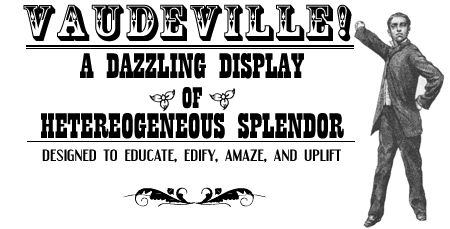
noun
- theatrical entertainment consisting of a number of individual performances, acts, or mixed numbers, as by comedians, singers, dancers, acrobats, and magicians.Compare variety(def 9).
- a theatrical piece of light or amusing character, interspersed with songs and dances.
- a satirical cabaret song.
noun
- mainly US and Canadian variety entertainment consisting of short acts such as acrobatic turns, song-and-dance routines, animal acts, etc, popular esp in the early 20th centuryBrit name: music hall
- a light or comic theatrical piece interspersed with songs and dances
1739, “light, popular song,” especially one sung on the stage, from French vaudeville, alteration (by influence of ville “town”) of Middle French vaudevire, said to be from (chanson du) Vau de Vire “(song of the) valley of Vire,” in the Calvados region of Normandy, first applied to the popular satirical songs of Olivier Basselin, a 15c. poet who lived in Vire.
The alternative explanation is that vaudevire derives from Middle French dialectal vauder “to go” + virer “to turn.” The meaning “theatrical entertainment interspersed with songs” first recorded 1827.
Light theatrical entertainment, popular in the late nineteenth and early twentieth centuries, consisting of a succession of short acts. A vaudeville show usually included comedians, singers, dancers, jugglers, trained animals, magicians, and the like.
 Liberal Dictionary English Dictionary
Liberal Dictionary English Dictionary